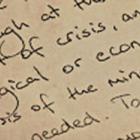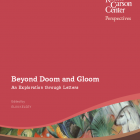Letter from Rachel Shindelar to Tim Jackson
Rachel Shindelar is a communication and advocacy associate of the United Nations University Institute for Integrated Management of Material Fluxes and of Resources (UNU-FLORES) in Dresden, Germany.
Tim Jackson is a ecological economist and professor of sustainable development at the University of Surrey, United Kingdom.
Dear Tim Jackson,
Every time I encounter your work, I go away feeling somewhat more hopeful. A strange experience, since your research focuses on the failings of our current economic paradigm and looming ecological and social crises. But it is not the subject of your research that leaves me feeling optimistic. It is the way you frame the future—as an unprecedented opportunity.
In the discourse and rhetoric surrounding the environment such a perspective is disturbingly rare. The media, environmentalists, politicians, and academics all seem committed to using the most devastating stories, pictures, and statistics available to drive home how dismal life will be. They foretell a future full of doom and gloom.
For quite a while, I too believed this was the only possible legitimate narrative for the state of the environment and humankind’s future on Earth. I would throw horrific facts and devastating prognoses at anyone whose behavior wasn’t “environmentally friendly” enough for me. Your work has helped me realize that this doom and gloom narrative is not the only valid narrative,
It seems to me that doom and gloom would neither be possible nor necessary as a narrative, if our society was not so fixated on material consumption and economic growth. We seem to believe that our wellbeing is inherently dependent upon them.. The ecological crises, therefore, is an economic crisis. And it, has been since the environmental movement began. One need only to look back at Limits to Growth[1] or the Stern Review.[2] Prices of commodities will soar. Energy will become scarce. Climate change will damage country credit ratings. Economic growth will slow down or even—god forbid—stop all together. We do not fear the end of the planet, but rather, the end of economic growth and development.
The publication of the Fifth IPCC Assessment Report provides a wonderful example. Following its release, headlines such as “Panel’s Warning on Climate Risk: Worst Is Yet to Come”[3] dominated the media. My two favorites were “Climate Change Threatens Economic Growth,”[4] and “Climate Change Report ‘Should Jolt People into Action’ Says IPCC Chief.”[5] They so clearly illustrate the fear-mongering that I find most disturbing.
Does this type of rhetoric motivate individual efforts to live more sustainably? Does painting a picture of doom and gloom inspire action? Apparently IPCC Chairman Rajendra Pachauri thinks so, and he is not alone. You only need to spend a few moments skimming the most recent newsletters from your favorite environmental activist organization to see that this strategy is widespread. The more dire the message, the more catastrophic the picture, the more frequently it is printed, posted, and ironically—“liked.” There is something disturbingly similar with this type of activism strategy and the scare tactics used by national governments in the cold war era.
Don’t get me wrong, I am fully aware that the environment is undeniably in a catastrophic state, that the economy as is will suffer dearly, and humankind’s relationship to our planet is in dire need of a makeover. But I cannot help wondering, how many times does someone have to be told “if you’re not scared, you’re not paying attention” before they completely lose all faith in their ability to make a difference? Before they decide to give up. Have you, Prof. Jackson, encountered this in your own research? The stifling effect of so much negativity?
To move beyond this suppressive narrative, I believe we must also move beyond the suppressive, growth-obsessed economic paradigm practiced around the world. Like you, I question whether the end of economic growth truly is the worst thing that could happen. I agree with you when you say that humankind can prosper without growth. Indeed, I am starting to wonder if the question isn’t whether we can survive without economic growth, but rather, can we continue to survive with it?
I am convinced that in a society that does not equate economic growth to human wellbeing there would be much more room for a narrative of hope, opportunity, and even freedom. Making the transition to a sustainable society would not be about giving up benefits, but about winning them. It would not be about changing human nature or denying prosperity, but about allowing ourselves the opportunity to become fully human. You mention a few of these benefits in your work: reduction of systemic inequality, freedom from status competition through material consumption, resilient social communities, freedom from fossil fuel dependency, increase in cultures of trust, and so many more.
But most importantly, the hope of a positive future!
I share your conviction that the transition to a sustainable society means a transition to a new economic paradigm. Perhaps the first step in this direction is going beyond the doom and gloom narrative: empowering people with a vision of the future that disentangles human well-being from material consumption and economic growth, and positions quality of life as its primary goal. In your book, you frame the reality of living on a finite planet not as a crisis but as a “unique opportunity”: an opportunity to improve our lifestyles and our democratic institutions. We need more newspaper headlines that read: “Climate Change: The Opportunity of a Millennium” or “There is Hope: The Benefits of Combating Climate Change.”
What could be more motivating than hope? Thank you for helping me find it again.
Sincerely,
Rachel Shindelar
[1] Donella Meadows, Dennis Meadows, Jorgen Randers, and William Behrens. The Limits to Growth. New York: Universe Books, 1972.
[2] Nicholas Stern. The Economics of Climate Change: The Stern Review. Cambridge: Cambridge University Press, 2007.
[3] Justin Gillis. “Panel’s Warning on Climate Risk: Worst Is Yet to Come.” New York Times, 31 March 2014.
[4] Mike Scott. “Climate Change Threatens Economic Growth—UN Report: How Should Investors React?” Forbes, 3 April 2014. Accessed 25 June 2014.
[5] Suzanne Goldenburg. “Climate Change Report ‘Should Jolt People into Action’ Says IPCC Chief.” The Guardian, 31 March 2014. Accessed 23 June 2014.
Further Readings
Constanza, Robert, Gar Alperovitz, Herman E. Daly, Joshua Farley, Carol Franco, Tim Jackson, Ida Kieszewski, Juliet Schor, and Peter Victor. Building a Sustainable and Desirable Economy-in-Society-in-Nature. New York: United Naitons Division for Sustainable Development, 2012.
Jackson, Tim. Prosperity without Growth: Economics for a Finite Planet. London: Earthscan, 2009.
Related links
Professor Tim Jackson’s Biography (University of Surrey)
Jackson, Tim. “An Economic Reality Check.” TEDGlobal 2010. Filmed July 2010.
Wikipedia article about Tim Jackson
- Constanza, Robert, Gar Alperovitz, Herman E. Daly, Joshua Farley, Carol Franco, Tim Jackson, Ida Kieszewski, Juliet Schor, and Peter Victor. Building a Sustainable and Desirable Economy-in-Society-in-Nature. New York: United Nations Division for Sustainable Development, 2012.
- Jackson, Tim. Prosperity without Growth: Economics for a Finite Planet. London: Earthscan, 2009.
- Previous chapter
- Next chapter













